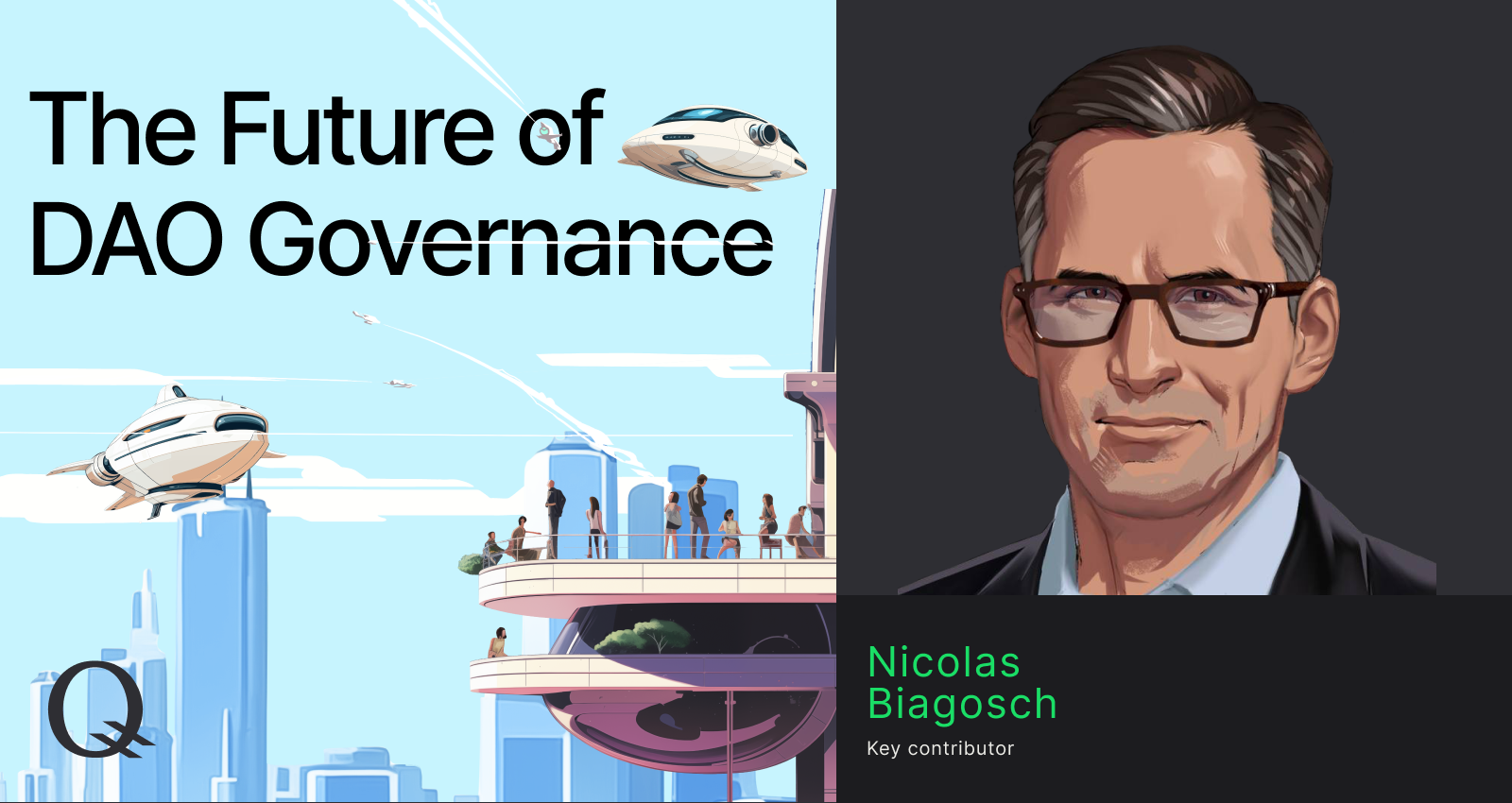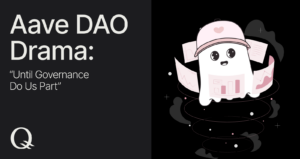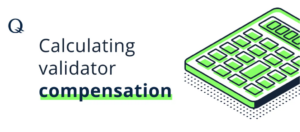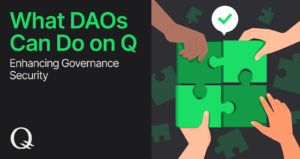Nicolas Biagosch, co-initiator of Q blockchain for DAO governance will give us a run through on how to build your DAO on Q Protocol. Previously: lawyer, tech CEO, business builder (join him if you want to build “intergalactic organizations”
The host of The Interop Show is Sebastien Couture.
Disclaimer: Please pay attention to the fact that this is an edited and condensed version of the interview; hence, some discrepancies might happen. To listen to the original conversation, visit The Interop Show page and choose the streaming platform of your choice.
Introduction
Sebastien Couture, the interviewer: Welcome to The Interop Show, I’m your host Sebastien Couture, and today we have Nicolas Biagosch, co-initiator of the Q protocol. Q is an innovative system addressing governance issues in the blockchain space, specifically focusing on dispute resolution. Nicolas, thanks for joining me.
Nicolas Biagosch: Thanks for having me, Sebastien. Excited to be here.
Sebastien: You have a legal and business background, having worked in various industries before diving into blockchain. How did you transition into solving DAO governance issues in the blockchain space?
Nicolas: My journey has been through law, business, and innovation. From my early days in Web1 to telecoms, I’ve always been at the intersection of business and governance.
When I discovered bitcoin, it felt like a missing piece in decentralizing information. However, I realized that not all decisions are binary, leading me to explore governance challenges in blockchain, especially with projects like MakerDAO.
Beyond “Code is Law.” Some Examples
Sebastien: DAO governance in blockchain often faces challenges, especially with decentralized autonomous organizations (DAOs). Can you share some examples where DAO governance has failed?
Nicolas: Absolutely. Projects like Aragon highlight the vulnerabilities in DAO governance. The lack of enforceable contracts and dispute resolution mechanisms can lead to catastrophic failures, as seen in these cases.
The Ooki DAO case is another case. A California judge ruled that all participants in the DAO shared unlimited liability. This was due to the absence of a contract or clear description of the DAO’s structure.
Sebastien: How does Q address these DAO governance challenges?
Nicolas: In our approach with Q, we offer a Constitution, a private contract among all DAO members. This document outlines the DAO’s identity, procedures, and integrates with the International Chamber of Commerce (ICC) for dispute resolution. Essentially, it provides a framework for courts to recognize and enforce DAO agreements.
Q is a comprehensive decentralized governance framework for Web3, integrating rule-setting, enforcement, and dispute resolution. If you have just one or two of those, it’s not governance but only a part of governance. By combining code and human language, Q offers a flexible approach to governance, enabling more nuanced decision-making beyond binary choices.
Sebastien: So, does Q enable blockchain governance to move beyond binary decisions?
Nicolas: Exactly. While code is crucial, Q goes beyond it, providing a framework for more complex decision-making. Another way to think about it is the following: Cosmos, Ethereum, and others are providing shared transaction security, right? And Q provides shared DAO governance security.
The lack of innovation in DeFi and the hesitation of traditional businesses to adopt blockchain stem from a common challenge: governance complexity. Many struggle to grasp decentralized governance, hindering their ability to fully embrace blockchain. Our goal is to address this gap by offering solutions that cater to their intricate business models.
How to build your DAO on Q?
Sebastien: How do applications or DAOs, or even chains, like in the case of a Cosmos chain, utilize Q? Would they have to build their DAO on Q or can Q sit as a sidecar to a chain or an existing DAO in order to benefit from all the things that it provides?
Nicolas: Both are possible. You can either build your full DAO on Q and then bridge for execution to another chain or into the application. But you can also just use certain aspects of it, for example, the code upgrading. You can build your DAO on another chain. You can have all of the internal DAO mechanisms on another chain and only use that one feature of Q acting as the external DAO governance security anchor.
We have three standard products at the moment: treasury oversight, code upgrades without admin keys, and expert decision oversight.
Sebastien: In the case of a Cosmos chain, let’s say you had a Cosmos chain that wanted to outsource parts of its governance to Q. If the execution is done on the chain, a decision could be made on Q, and then it has to be settled on the chain. At that point, validators of that chain could collude to not execute the decision. How would Q even work in that case? How does it enforce things happening on another settlement layer?
Nicolas: Most probably, like with some chains, that would require an integration with Q and the chain. We have the DAO governance on top of a DPoS chain and the integration is such that root nodes are able to take out rogue validators from consensus in order to remain the integrity of the chain. That’s on the Q chain, so an integration with Q, depending on how deep you want to go, could be done this way.
The Q Constitution and DAO Governance
Sebastien: Tell us more about the Q Constitution and how it forms a binding agreement.
Nicolas: The Q Constitution lays out the rules governing the Q protocol in detail, defining stakeholders’ rights and decision-making processes. It acts as a private contract among all members and stakeholders, ensuring transparency and accountability in governance.
Sebastien: In some jurisdictions, contracts need to be signed on paper to be binding. How does Q Protocol address legal particularities across different regions?
Nicolas: We’ve avoided obligations that could conflict with consumer protection laws. Instead, we focus on inter-professional dealings. For international contracts, we follow widely accepted rules like UNIDROIT.
We envision a global digital economy. If actors reside in different nations, centralized legal systems won’t suffice. Token holders play a crucial role in ensuring decentralization and preventing centralization under regional legal systems
Sebastien: Who are the main stakeholders in Q Protocol?
Nicolas: There are four main stakeholders: validators, root nodes, expert panel members, and token holders. Validators maintain the blockchain, while root nodes oversee them based on the Q constitution. Expert panels make decisions within defined rules, and token holders ultimately own and govern the system.
Sebastien: Why involve token holders in governance?
Nicolas: Token holders drive governance decisions by using the Q token for governance activities. Like citizens in a society, they should have a say in the system they use. Token ownership aligns incentives for participation and decentralization.
Sebastien: What’s the difference between validators and root nodes?
Nicolas: Validators validate blocks anonymously, while root nodes oversee them openly. Root nodes are voted in by token holders and ensure compliance with the Q constitution. They’re dispersed globally and diverse in expertise to maintain independence.
Sebastien: Is Q Protocol’s governance system like a two-tiered model?
Nicolas: Yes, it resembles an upper and lower house. Root nodes act as an upper house, overseeing validators and maintaining independence from their incentives. This structure ensures robust governance and decentralization.
In setting up the Q Protocol, the distribution of powers was crucial. Integrators can define various levels of governance, with sub-DAOs overseen by root nodes acting as referees or enforcers. Expert panels help make informed decisions on complex matters like collateralization ratios in DeFi protocols.
Sebastien: Could you elaborate on the role of expert panels and how they aid decision-making?
Nicolas Biagosch: Expert panels address complex decisions where crowds may lack expertise, ensuring more informed choices. For example, they can determine parameters in DeFi protocols like collateralization ratios and asset eligibility, either bindingly or for discussion.
Sebastien: Summarizing, Q token holders elect root nodes, who monitor validators securing the chain and enforcing the Constitution. But how do token holders choose competent root nodes?
Nicolas Biagosch: Token holders assess root nodes’ neutrality and adherence to predefined rules, ensuring their independence and integrity. Algorithms define root node qualifications, allowing for transparent selection.
Sebastien: Can you explain how disputes are resolved within Q Protocol’s governance system?
Nicolas Biagosch: Disputes are addressed by root nodes or external expert panels, ensuring decisions comply with predefined rules. If contested, arbitration may be sought, with root nodes serving as credible oracles for off-chain events.
Sebastien: How does Q Protocol integrate with other blockchain networks or applications?
Nicolas Biagosch: Q Protocol can fully host a DAO or provide specific governance features to existing systems. Integrations may involve decisions being made on Q and executed elsewhere, requiring a seamless interaction between networks.
Sebastien: Regarding network states and the governance of emerging technologies like AI, how does Q Protocol fit into this landscape?
Nicolas Biagosch: Q Protocol initially emerged from discussions around network states, envisioning a comprehensive governance framework for various applications. In an increasingly digital world, such frameworks become essential for ensuring independence and functionality.
If we believe that there’s gonna be a digital global economy that continues growing, then the infrastructure for this economy should be digital and global too. Bitcoin has given us the ability to transact globally and permissionless. Ethereum has added the ability to encode arbitrary deterministic transactions. The Q Protocol takes this one step further by adding the capability to enforce non-deterministic rule-sets in a decentralized way.
Did we get you curious? Watch the whole podcast episode on Youtube or a platform of choice.
Learn about Q at q.org. Follow us on X @QBlockchain






Leave a Reply